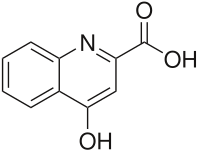
Photo from wikipedia
The tryptophan metabolite, kynurenic acid (KYNA), is a preferential antagonist of the α7 nicotinic acetylcholine receptor and N-methyl-d-aspartic acid receptor at endogenous brain concentrations. Recent studies have suggested that increased… Click to show full abstract
The tryptophan metabolite, kynurenic acid (KYNA), is a preferential antagonist of the α7 nicotinic acetylcholine receptor and N-methyl-d-aspartic acid receptor at endogenous brain concentrations. Recent studies have suggested that increased brain KYNA levels are involved in psychiatric disorders such as schizophrenia and depression. Most of the brain kynurenine (KYN), the KYNA precursor, comes from the periphery, and the liver has a central role in the peripheral tryptophan metabolism. In this study, the effect of acute liver failure (ALF) on brain KYNA production and on the peripheral tryptophan metabolism was investigated in rats. ALF was induced by administration of the hepatotoxin, thioacetamide (TAA). Brain KYNA levels were increased by TAA-induced ALF, and these increases were consistent with KYN levels in the brain, serum and liver. These results suggest that the ALF-induced increase in serum KYN contributes to the increase in brain KYNA via elevated KYN uptake within the brain. This increase in serum KYN level can be caused by the changes in tryptophan-2,3-dioxygenase activity in the liver and the immune-related activation of indoleamine-2,3-dioxygenase in extrahepatic tissues. These findings suggest that hepatic dysfunction may contribute to neurological and psychiatric diseases associated with increased KYNA levels.
Journal Title: Neuroscience Letters
Year Published: 2019
Link to full text (if available)
Share on Social Media: Sign Up to like & get
recommendations!